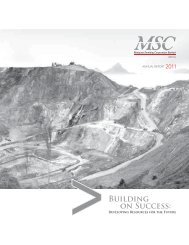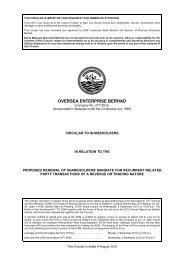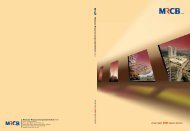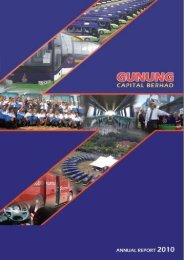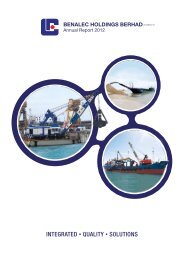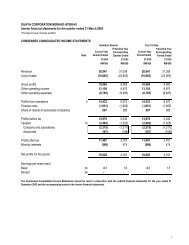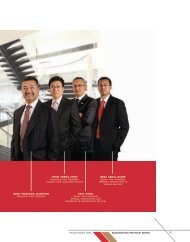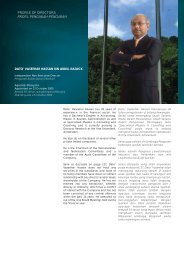Download PDF - ChartNexus
Download PDF - ChartNexus
Download PDF - ChartNexus
Create successful ePaper yourself
Turn your PDF publications into a flip-book with our unique Google optimized e-Paper software.
NOTES TO THE FINANCIAL STATEMENTS (cont’d)<br />
31 DECEMBER 2012<br />
37 MATERIAL LITIGATION<br />
Gunung Resources Sdn. Bhd. (“GRSB”), a wholly-owned subsdiary, was served with a Summons and Statement of Claim<br />
on 19 September 2006 by Seal Polymer Industries Berhad (“SPI”) for allegedly failing to refund a sum of deposits of<br />
RM928,000 paid by SPI to GRSB together with interest pursuant to the Sales & Purchase Agreement (“SPA”) dated 17<br />
August 2004 for an intended purchase of one of GRSB’s leasehold properties that has lapsed.<br />
On 25 October 2007, the High Court in Taiping allowed SPI’s application for summary judgement for the refund of 10%<br />
deposit paid by SPI to GRSB together with interest/damages/costs. GRSB’s solicitors had filed an appeal to the Court of<br />
Appeal against the decision and application for stay of execution of the summary judgement on grounds that there<br />
appears to have triable issues.<br />
The Court of Appeal has ordered that a sum of RM928,000 to be deposited into a joint account with GRSB’s Solicitors<br />
until the outcome of the Appeal before the Court of Appeal. GRSB later succeeded in setting aside the summary<br />
judgement granted by the Taiping High Court on 14 October 2007 and secured the release of the sum of RM928,000<br />
in the Solicitors’ joint account to be released to GRSB together with accumulated interest.<br />
The case was fixed for full hearing on 24 - 25 of February 2011 at the Taiping High Court. On 28 April 2011, the Taiping<br />
High Court has dismissed the claims made by SPI and ruled that SPI had failed to fulfil their obligations under the SPA<br />
dated 17 August 2004. During the financial year ended 31 December 2011, GRSB has forfeited the deposit sum of<br />
RM928,000 with costs and has recognised the amount as other income.<br />
A Notice of Appeal has been filed to the Court of Appeal by SPI on 11 May 2011 against the Taiping High Court’s ruling.<br />
On 10 April 2013, The Court of Appeal has dismissed SPI’s appeal on the same grounds of the Taiping High Court’s<br />
ruling. GRSB was justified in forfeiting the deposit sum of RM928,000.<br />
38 FINANCIAL RISK MANAGEMENT OBJECTIVES AND POLICIES<br />
The Group’s and the Company’s financial risk management policy seeks to ensure that adequate financial resources<br />
are available for the development of its businesses and has adopted risk management policies that seek to mitigate<br />
these risks in a cost-effective manner. The Group’s activities are exposed to interest rate risk, credit risk and liquidity<br />
risk. The Group has minimal transactions in foreign currency and has no quoted investment; hence it is not exposed to<br />
foreign currency risk and equity price risk.<br />
(a) Interest Rate Risk<br />
Interest rate risk is the risk that the fair value or future cash flows of the Group’s and of the Company’s financial<br />
instruments will fluctuate because of changes in market interest rates.<br />
The Group finances its operations through operating cash flows and borrowings which are principally denominated<br />
in Ringgit Malaysia. The Group is exposed to interest rate risk mainly form their loans and borrowings and fixed<br />
deposits with financial institutions. However, the financial assets are held for short to medium term, and as such,<br />
interest rate fluctuations are not expected to have material impact on the carrying value of the said assets. The<br />
Group’s borrowings comprise of mainly finance leases and hire purchase obligations, which are not subject to<br />
interest rate risk. Short term bridging loan is obtained for only three months, and as such interest rate fluctuations<br />
are not expected to have material impact.<br />
As such there is no formal hedging policy in respect of interest rate exposure. The interest rate risk is monitored<br />
on an on-going basis and the Group endeavours to keep the exposure at an acceptable level.<br />
(b) Credit Risk<br />
Credit risk is the risk of loss that may arise on outstanding financial instruments should a counterparty default on<br />
its obligations. The Group’s exposure to credit risk arises primarily from trade and other receivables. The Group<br />
manages its credit risk through the review and monitoring of outstanding amounts on an on-going basis.<br />
Gunung Capital Berhad (330171-P)<br />
91<br />
annual report | 2012



